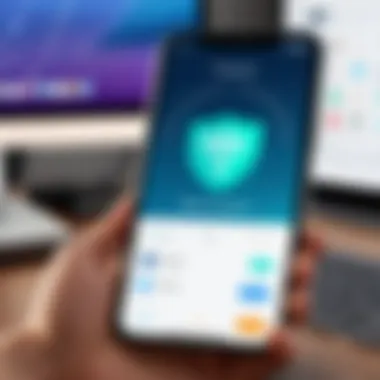Top Free VPN Apps for iOS: Benefits and Limitations


Intro
In today’s fast-paced digital world, protecting our online presence has become more crucial than ever. Virtual Private Networks (VPNs) have surged in popularity as a safeguard against increasing cybersecurity threats and privacy breaches. For iOS users, the options may seem overwhelming, especially with a plethora of free VPN applications available claiming to offer security without breaking the bank.
It's important to tread carefully. Many free VPNs come with strings attached, while others can offer surprisingly robust features that rival paid options. This article aims to unpack the landscape of free VPN apps for iOS, diving into their strengths and limitations, helping you discern which app may best serve your needs.
Understanding the relevance of this topic is paramount. With the rise of remote work and a shift toward digital communication, users are frequently exposed to potential vulnerabilities. From corporate data breaches to phishing scams, knowing how to navigate this treacherous online terrain can mean the difference between digital security and disaster.
By the end of this examination, readers will be equipped with the knowledge needed to make informed decisions about free VPN services, thereby enhancing their online security and privacy.
Prolusion to VPNs
In today’s digital world, where personal information is often just a few clicks away from prying eyes, understanding Virtual Private Networks (VPNs) is more crucial than ever. VPNs serve as a shield, cloaking your online activities and offering a hint of anonymity, especially when you’re connecting to public Wi-Fi networks. They provide a way for users to browse the internet securely and privately, making them an indispensable tool for anyone concerned about digital security.
Venturing into the topic of free VPN apps for iOS leads us to explore a multifaceted realm filled with benefits and drawbacks. These applications stand out for their ability to offer crucial privacy protections at no cost, which can be a lifesaver for many users just starting with digital security.
When we break this down further, we discover a myriad of elements to consider: how easy an app is to use, how well it performs in speed tests, and, importantly, what data policies govern user privacy. Each of these factors contributes to the overarching purpose of a VPN: to protect users while they navigate the vast and often perilous waters of the internet.
Understanding Virtual Private Networks
Virtual Private Networks work by routing your internet connection through a secure server, thereby masking your IP address and encrypting your data. Imagine it as a private tunnel through the chaotic streets of the digital world. Without this secured route, your information could be intercepted or monitored by third parties, be it hackers or intrusive marketing firms.
VPNs create an encrypted connection that helps users maintain privacy. This is especially important when using devices on public networks, where threats of data theft are at an all-time high. While the exact workings can sound a bit technical, the essential concept is straightforward: VPNs help keep your data private.
Moreover, VPNs can allow users to access content that might be restricted due to geographical limitations, enabling a broader range of internet freedom.
Importance of VPNs for iOS Users
For iOS users, the stakes can be even higher. Apple devices are widely regarded for their robust security features, but they are not completely immune to vulnerabilities. Using a VPN enhances this security, especially in environments where you are not in control of the network.
- Privacy Protection: iOS users often handle sensitive data—whether it's personal details, banking information, or corporate documents. A VPN helps shield that information from potential dangers.
- Bypassing Restrictions: Some iOS users may face restrictions based on their geographical location. VPNs allow them to navigate around these barriers, accessing content as if they were in a different country.
- Secure Public Wi-Fi Usage: Given the prevalence of public Wi-Fi hotspots, iOS users are frequently exposed to security risks. Utilizing a VPN transforms these often vulnerable connections into relatively secure ones.
- Enhanced Streaming Experience: With many streaming services imposing regional limitations, users can leverage VPN services to enjoy their favorite shows and movies without interruption.
"In the age of information, ignorance is a choice. Don’t let your data just float in the cloud; keep it anchored!"
Criteria for Evaluating Free VPN Apps
In the crowded fields of free VPN applications, distinguishing between them can be like finding a needle in a haystack. Numerous options exist, and selecting the right one requires careful consideration of several vital criteria. Understanding these standards is crucial for users seeking to enhance their privacy and security online.
Privacy Policies and Data Protection
One of the first things to scrutinize in a VPN app is its privacy policies. Not all VPN services treat user data the same, so it’s imperative to know what is and isn’t logged. A trustworthy VPN will have clear, transparent policies about data collection. They should minimize logs to just what’s essential for service operation. Some even provide an independent audit to validate their policies.
Consider the following points when reviewing privacy policies:
- Data Collection: Check if the app collects browser history, connection times, or other personal details.
- Third-Party Sharing: Be wary of apps that share data with advertisers or other entities.
- Jurisdiction: Understand the legal frameworks where the VPN operates. Some countries enforce strict data retention laws.
Users should weigh these factors seriously. A VPN that boasts of security but has a dubious data policy is merely putting lipstick on a pig.
Speed and Performance Metrics
Speed tends to be a double-edged sword with free VPNs. While seeking secure browsing, users often encounter speed throttling. Free services may cap the bandwidth to manage server loads or encourage users to upgrade to paid plans. Hence, it's essential to assess performance metrics.
Here are key aspects to consider:
- Latency: Low latency is paramount for tasks like streaming or gaming.
- Download/Upload Speeds: Measure how much the VPN affects your normal Internet speeds, as this can impact daily usage drastically.
- Server Locations: A more extensive range of server locations generally offers better speed options by connecting to less crowded servers.
Some free VPN apps may provide a trial version enabling potential users to gauge their performance benchmark before making a long-term commitment.
User Interface and Experience


An overly complex user interface can frustrate even tech-savvy users. Simplicity and ease of use are pivotal for general satisfaction. An effective VPN app should allow users to connect with a single tap, and it should feature intuitive designs.
Consider the following:
- Ease of Navigation: Is it straightforward to find settings or navigate through the server list?
- Customization Options: Does the app enable users to adjust settings according to their needs?
- User Support: What kind of support is available? Accessible help features enhance user experiences significantly.
A slick interface accompanied by straightforward functionalities can elevate the user experience from ordinary to extraordinary.
Reliability and Connection Stability
When the rubber meets the road, reliable connections are non-negotiable. Nothing is more annoying than your VPN dropping unexpectedly, especially while handling sensitive tasks. Hence, it is essential to evaluate connection stability thoroughly.
Things to look for include:
- Consistent Connections: Does the VPN regularly provide uninterrupted services?
- Reconnection Capabilities: How quickly can the app reconnect after a drop?
- Device Compatibility: Ensure the VPN works seamlessly across all intended devices.
Connection issues can lead to exposure of personal data, turning a seemingly secure browsing experience into a giant risk.
Ensuring your VPN app checks all these boxes can save online users from a plethora of privacy risks and connectivity woes.
Leading Free VPN Apps for iOS
The importance of leading free VPN apps for iOS cannot be overstated. With the increasing concerns around online privacy and security, these applications serve as essential tools for safeguarding personal data. Free VPNs can provide users with the ability to surf the internet anonymously and access restricted content, making them a vital option for many. In particular, iOS users benefit from VPNs that are optimized for mobile devices, which enhances both convenience and usability without sacrificing performance.
When evaluating the leading free VPN apps, several specific elements come into play. For instance, features like ease of use, speed, and data security hold significant weight. Moreover, the practical considerations of choosing the right VPN—such as the availability of servers across different regions and the app’s overall compatibility with iOS—can greatly influence user experiences.
Let's delve deeper into five prominent free VPN applications for iOS, examining their strengths and weaknesses to help users make informed choices.
App One: A Comprehensive Review
Features
One of the standout features of App One is its user-friendly interface, which appeals to both tech-savvy individuals and those less familiar with technology. The intuitive design simplifies the connection process, making it easy to switch between servers. Notably, this app also boasts a unique split tunneling feature, allowing users to choose which apps connect through the VPN and which do not. This can help maintain speed while securing sensitive information.
Among its many pros, App One specifically shines in its robust privacy protections. However, users should keep in mind that its free version may limit access to certain server locations, which can impede the overall experience for those seeking unrestricted browsing.
Pros and Cons
Pros include the exceptional simplicity of use, making it a popular choice for first-time VPN users. The app also features strong encryption protocols and a no-logs policy, crucial for maintaining user anonymity. On the downside, some users have reported speed throttling in peak times, which can hinder performance. The limitations on server access in the free version can also be a downside for those wishing to unlock more global content.
User Feedback
Feedback about App One tends to highlight its ease of use, earning praise for its intuitive setup process. Many users appreciate the straightforward design, but some have mentioned that tech support can be a bit lackluster at times. Overall, it seems to craft an appealing niche for casual users, who value straightforwardness over advanced features.
App Two: A Critical Analysis
Features
App Two stands out for its innovative data compression feature. This allows for faster loading times when streaming content, which can be a game changer for users dependent on mobile internet speeds. Additionally, it provides a variety of security protocols— users can select the best fit for their needs, balancing speed and security based on their preferences.
However, despite these appealing features, the service is often critiqued for its limited free data allowance, which might prompt users to look elsewhere, especially heavy data consumers.
Pros and Cons
On the positive side, this app offers an impressive speed boost thanks to the data compression feature. Many users enjoy the enhanced viewing experience while online. The cons are often tied to that limited data and questionable data privacy practices reported by some users, which raises eyebrows about potential logging of data.
User Feedback
User reviews of App Two generally reflect satisfaction with its performance but voice concerns about data privacy. Users appreciate the speed and usability while lamenting the constraints of free usage, often urging developers to improve upon the free offerings without compromising on privacy.
App Three: In-Depth Evaluation


Features
The most notable feature of App Three is its automatic kill switch. This ensures that if the VPN connection drops unexpectedly, the internet connection is severed, preventing data leaks during those moments. The app also boasts extensive server coverage globally, allowing users to easily choose local or international options.
While the kill switch feature represents a major advantage in maintaining data privacy, it has drawn some adverse feedback regarding its functionality—users have mentioned inconsistent performance occasionally.
Pros and Cons
This app is prized for its strong security features, especially the inclusion of the kill switch, appealing to users with serious privacy concerns. Conversely, the inconsistencies in connection can dampen user experience and reliability, which might leave some users seeking a more stable option.
User Feedback
Users have shown appreciation for the app's commitment to security, with many reporting satisfaction with the kill switch feature. However, reviews often point out the connection hiccups experienced, which could lead to frustration in critical moments, challenging its effectiveness as a reliable VPN solution.
App Four: Key Considerations
Features
App Four impresses users with its multi-device support, allowing a single free account to protect up to five devices simultaneously. This feature is particularly attractive for families or users with multiple gadgets. It also maintains a clean user interface, ensuring seamless navigation and setup.
However, the multi-device feature comes at a price—users have cited reduced speeds when connecting multiple devices, which necessitates trade-offs for users wanting to maximize connection efficiency across devices.
Pros and Cons
Multi-device capability represents a huge pro for users seeking to protect several devices without paying for more than one account. One downside is the speed reduction, which can be frustrating for users attempting to stream or download large files.
User Feedback
Most user feedback highlights appreciation for ease of connectivity across devices. Despite the speed issues, users love that they can protect multiple gadgets. Feedback reiterates that, overall, it meets needs but leaves some feeling it may not hold up as strongly under heavier loads.
App Five: Final Thoughts
Features
App Five is recognized for its ad-blocking feature, which can significantly enhance browsing speed and user experience. It also includes frequent app updates, ensuring users receive the latest security enhancements and functionality, making it a reliable choice for ongoing use.
However, the ad-blocking may affect sites with critical advertisement-dependent revenue streams, which can affect some users' experiences negatively.
Pros and Cons
The ad-blocker is a notable pro, greatly improving the speed of browsing. The regular updates also contribute to a sense of security and reliability. On the flip side, the potential block on legitimate advertisements can create issues for websites reliant on ad income, prompting some concerns from users who want full access.
User Feedback
Praise for the ad-blocking feature is widespread among users, with many commending how it makes browsing smoother. Despite this, others have mentioned that it can create issues in viewing content on certain sites, reflecting a mixed bag of experiences with this app.
Overall, selecting the right free VPN app not only hinges on personal requirements but also understanding the inherent trade-offs that come with free services. Each of these apps has distinct characteristics, and acknowledging their pros and cons can be a key factor to making an informed choice.
Potential Risks of Free VPN Services
As appealing as free VPN services may appear, there are significant risks that lurk beneath the surface. Ideally, these services should provide users with a safer and encrypted browsing experience, but in reality, the devil is often in the details. Understanding the potential pitfalls of using free VPN apps on iOS is crucial, especially as these threats can undermine the very benefits users seek. Let’s break down the most pressing risks associated with free VPN services, so you can navigate this treacherous terrain more safely.
Data Logging Practices
Free VPN services can be a double-edged sword when it comes to privacy. Many users believe that just by using a VPN, their online behaviors are shielded from prying eyes. Unfortunately, this isn't always the case. Some free VPN providers engage in data logging—keeping track of your internet activities, which severely compromises your privacy.
- Types of Data Logged: This can include IP addresses, browsing histories, and even timestamps. These kinds of data logs can create a profile of your online habits, potentially exposing you to third parties.
- Usage for Profit: Free VPNs often monetize the data they collect by selling it to advertisers. In essence, you might be trading one form of exposure for another, which defeats the purpose of using a VPN in the first place.
- Lack of Transparency: A quick glance at the privacy policy (if they have one) might not reveal the full extent of their logging practices.
It’s essential to read the fine print and critically analyze how, and if, the VPN you’re considering tracks your data.


Malware and Security Vulnerabilities
Security should be a top priority when considering any VPN service, especially free ones. There’s a considerable risk that some free VPN applications may harbor malware, which not only jeopardizes your personal data but could also infect your device or network.
- Embedded Malware: Some free VPN apps might come with malicious code embedded, designed to capture sensitive information or deploy ads inappropriately. This is particularly alarming for those who frequently handle sensitive data.
- Inadequate Encryption Protocols: Many free services do not provide robust encryption. Without strong encryption protocols in place, your connection can be intercepted, leaving your data vulnerable to eavesdropping.
- Frequent Security Flaws: Many of these apps lack regular security updates, leading to vulnerabilities that cybercriminals can exploit.
It's vital to vet any app before downloading it and to consider even well-reviewed options critically, as some may still harbor security threats.
Connection Throttling and Speed Issues
Another common grievance among users of free VPN services is that they can suffer from connection throttling, which refers to intentional slow-downs imposed by the VPN provider. Trusting your connection with a free VPN can lead to frustrating experiences.
- Bandwidth Limitations: Many free VPNs impose strict limitations on the amount of data you can use or throttle your connection speed after reaching a certain threshold. Some even prioritize paying customers over free users, leading to glacial speeds.
- Shared Server Load: When a service is free, many users tend to flock to it. The increased load on servers can wreak havoc on connection stability and speed, making for a poor service experience.
- Intermittent Disconnects: Free VPN services often exhibit problematic connectivity, leading to frequent dropouts. Being disconnected while accessing sensitive information online is a risk you simply can't afford.
In essence, while free VPN apps can present attractive options for casual browsing or limited accessibility, they often come bundled with a cloud of risks. Equip yourself with the knowledge necessary to make informed choices, weighing convenience against potential hazards as you navigate online privacy with these free VPN solutions.
Best Practices for Using Free VPNs on iOS
Using a free VPN on iOS can significantly enhance your privacy and security online, but not without a few caveats. Adopting best practices while using these services is crucial to ensuring that you actually benefit from the features provided. The right combination of practices helps safeguard your data, improve your browsing experience, and make more informed decisions regarding your digital footprint. Let's explore the key practices that can contribute to a safer and more effective use of free VPNs on iOS.
Choosing the Right VPN for Specific Needs
Not all free VPNs are created equal. Each has its own peculiarities, strengths, and limitations. When choosing a VPN, consider what you need it for: is it streaming, bypassing censorship, or simply for enhanced privacy? Take note of the following factors:
- Use Case: Determine if the VPN can handle your specific activities. Not all free VPNs support streaming services like Netflix or Hulu.
- Geographic Options: If you often connect from a particular region, ensure the VPN has adequate servers there.
- User Reviews: Look at other users’ feedback regarding performance and reliability. Forums like reddit.com can provide valuable insights.
In deciding on a VPN, weigh your options like a seasoned traveler packing for a trip: be prepared for what's ahead!
Configuring Settings for Optimal Security
After you've chosen a VPN service that mirrors your needs, the next step is configuration. Leaving settings on default might not provide the protection you're looking for. Here are some points to consider:
- Enable Kill Switch: This feature will cut your internet connection if the VPN fails, keeping your data protected.
- Choose Strong Encryption: Opt for protocols that offer robust encryption, like OpenVPN or IKEv2. They generally provide better security.
- Adjust Privacy Settings: Make sure to turn on features that conceal your actual IP address and ensure that your DNS queries are sent through a secure channel.
It’s like tuning a musical instrument: the right adjustments can lead to a harmonious online experience.
Conducting Regular Security Assessments
Lastly, routinely evaluating the performance and security of your chosen VPN is vital in this fast-evolving tech landscape. Here’s how you can keep it all in check:
- Monitor Connection Logs: Check if your VPN provider keeps logs of your online activities. This can give you a sense of how your data is being handled.
- Speed Tests: Conduct speed tests periodically to gauge performance. This is important, especially if you notice a lag in your browsing experience. There are various tools available online for this purpose.
- Stay Updated: Keep your VPN app updated. Developers regularly patch vulnerabilities and introduce features that enhance security.
Regular assessments are like a health check-up for your VPN. It ensures that you're not only secure but also getting the performance you expect.
By weaving these best practices into your routine while using free VPNs, you not only strengthen your online security but also optimize your overall experience. With a clear understanding of your specific needs, appropriate configurations, and regular evaluations, you’ll certainly maximize the utility of your chosen VPN.
Culmination: Making an Informed Choice
The ever-evolving landscape of digital privacy makes the choice of a VPN app a significant one for iOS users. With the growing concern over data breaches and online surveillance, selecting a reliable free VPN can offer a first line of defense against malicious actors. However, navigating through the myriad of options requires a multifaceted approach, considering not just the features offered but also the limitations inherent in free services.
Understanding the key aspects of various free VPN applications can arm users with the insight needed to make informed decisions. It's crucial to carefully evaluate the privacy policies of the VPN service—after all, a provider that prioritizes user privacy will generally enhance your overall security. Additionally, keeping an eye on user experiences and performance results can reveal valuable information about connection stability and speed, which are essential for a seamless online experience.
Recap of Key Insights
In summing up the essentials gathered throughout this article, readers should take note of the following pivotal elements:
- Privacy Policies Matter: Always review the privacy policies before opting for a service. Understanding how your data is treated can save much heartache later.
- Performance Is Key: VPNs that promise faster speeds may come with strings attached—for instance, connection limitations or data caps. Be informed before downloading.
- User Experience Counts: The interface and usability can greatly influence how effectively you use the VPN. A complicated interface may deter you from utilizing the service to its full potential.
"A wise consumer always does their homework before entering the marketplace."
The discussion of risks associated with free VPNs should also serve as a cautionary tale. Look out for common pitfalls, such as data logging and the potential spread of malware.
Future Considerations for iOS Users
Looking forward, iOS users should consider several trends and factors that may shape their VPN choices:
- Evolving Technology: With advancements in technology, even free VPN options will likely continue to adapt, offering more features and improved security protocols. Staying updated with the latest developments can help users harness these innovations effectively.
- Regulatory Changes: As privacy laws change, some VPN services may either enhance or weaken their privacy commitments. Keeping abreast of these regulatory shifts will be vital.
- User Education: As digital literacy increases, users will become more aware of what a VPN can and cannot do. This understanding will lead to more informed choices when selecting an app.







